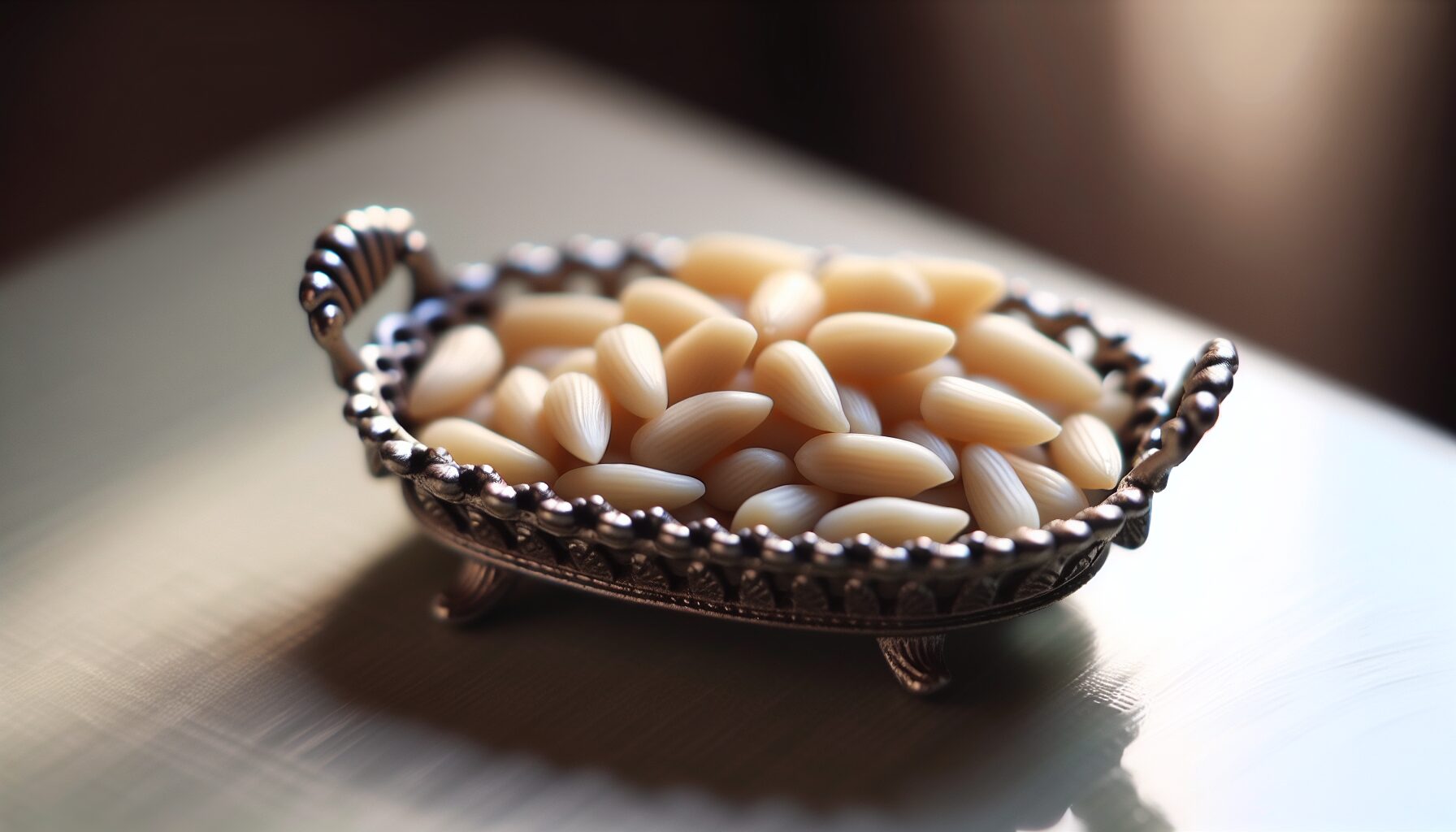
Health Benefits Of Eating Pine Nuts
The health benefits of eating pine nuts are extensive, considering their nutrient density and may include muscle recovery support or systemic inflammation reduction. Pine nuts are very small and easy to eat in larger quantities. Considering the size of pine nuts, you could also blend them into a healthy juice drink. Pine nuts are really versatile in the kitchen and are easily used in various dishes. They come from all over the world including Siberia and Korea. The demand for pine nuts is steadily increasing year on year.
The pine nut contains considerable levels of minerals such as potassium, copper, manganese, zinc and magnesium that could easily contribute to our overall wellbeing. Pine nut oil, extracted from pine nuts, is also thought to be able to reduce appetite or reduce weight gain. This may be due its healthy fatty acid content, which is not unusual for oil based nuts.
The oil content of pine nuts does vary from other seeds or nuts that contain large amounts of polyunsaturated fatty acids. Unsaturated polymethylene interrupted fatty acids, as found in pine nuts, could offer unique health benefits.
Pine nuts are rich in pinolenic acid. This is an unsaturated fatty acid that is thought to have anti-inflammatory effects within cells. Some studies show that it discourages cancer formation or is preventative of cancer and pine nuts could prime our immune system.
Here the potential health benefits of eating pine nuts will be considered to show how they could be of benefit to our diet.

Pine Nut Nutrient Contents
Pine nuts are really easy to add to our regular diet, contributing very nicely to sustaining optimal mineral levels in the body. Another of the various potential health benefits of eating pine nuts is a good amino acid profile, while they also offer a prebiotic aspect for our gut microbes.
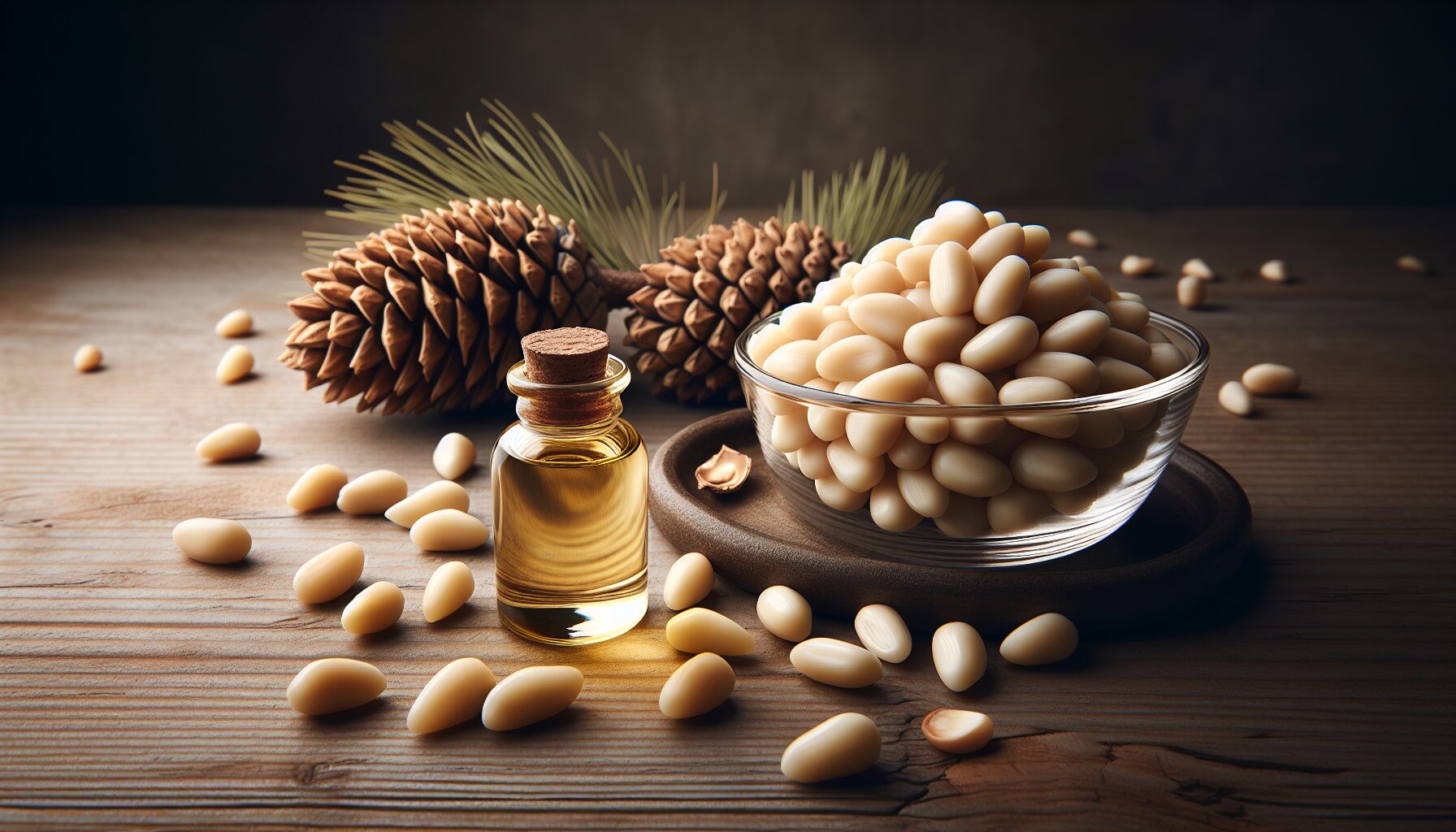
Potassium
In 100 grams of pine nuts you can obtain about 655mg of potassium, covering about a third or so of our RDA for potassium. Pine nuts are therefore a good source of this essential electrolyte.
Potassium is needed in large amounts in the body, with potassium being important for healthy muscular movements and nerve transmissions. Elevated potassium levels are also linked with a reduced risks of strokes.
Phosphorus
Phosphorus is one of our favourite nutrients here, it is everywhere in many lifeforms but not in high quantities. This is one key reason why we need to regularly consume food to support our wellbeing.
Phosphorus supports optimal bone health and is the life supporting backbone to most of the lifeforms on Earth. Without phosphorus, you can’t produce DNA. Phosphorus binds to mineralized calcium in bone to form strong bones. Higher bone density contributes to improved gym results. Phosphorus has a positive relationship with our immunity and growth.
100 grams of pine nuts contains 540mg of phosphorus. We have an 700mg RDA for phosphorus and so pine nuts can support a healthy daily intake of phosphorus. Eating pine nuts regularly may have potential health benefits thorough supporting health growth within the body.
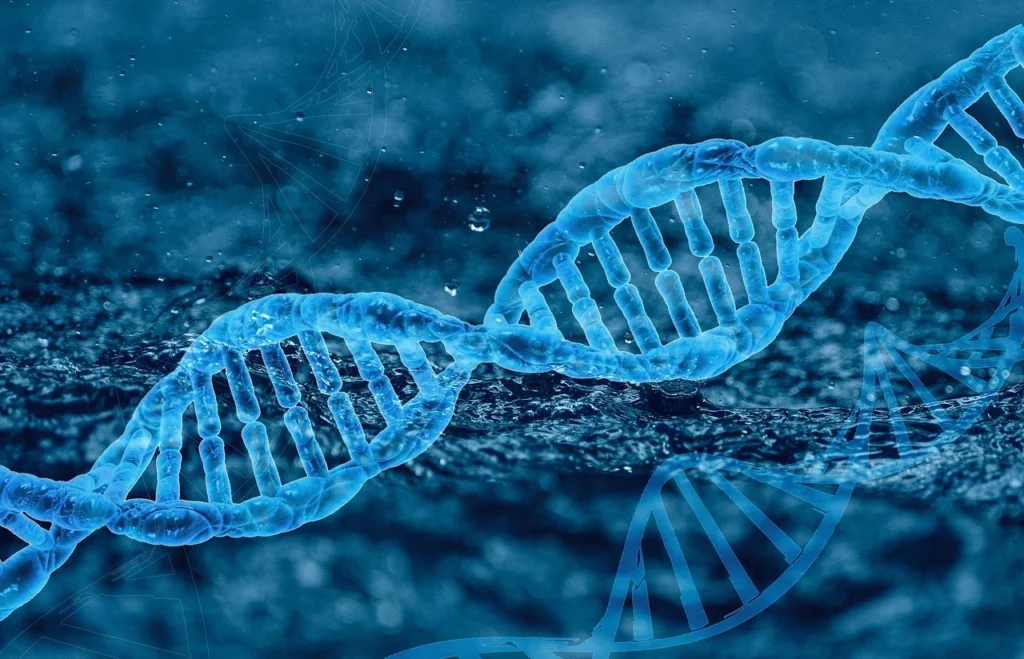
Copper
Copper supports key enzymes of your mitochondria, which produce energy in the body. It is needed to form red blood cells. Copper deficiency can lead to red blood cell deficient anaemia and excessive tiredness.
This mineral is very important for brain health, maintaining myelin coatings, that support quicker nerve signalling from cell to cell.
There is about 1mg of copper per 100 grams of pine nuts, so nearly covers our RDA in 100 grams.
Manganese
The manganese content of pine nuts is 10.2mg per 100 grams of pine nuts. Your RDA for manganese is between 2mg and 2.6mg a day. Pine nuts are therefore a really good source of manganese.
Manganese plays a very important role in the body, supporting many metabolic processes. It does this through its involvement in enzyme activity. Manganese is a key regulating factor for the production of many enzymes throughout the body, regulating growth in the body.
Manganese status affects bone formation, neurotransmitter synthesis, hormone production and can also affect blood glucose levels. The most important role of manganese is for superoxide dismutase production, which preventative of oxidative damagefrom free radicals. Manganese status is therefore linked to cancer risk. Manganese could also improve athletic performance and so regular pine nut consumption could support success at the gym.
Zinc
Zinc has neuroprotective properties and may help to prevent dementia. This antioxidant mineral can also improve resistance to infections. Deficiencies in zinc are also linked to reduced testosterone levels. So, zinc influences muscle formation and fertility.
In 100 grams of pine nuts there is 5.71 grams of zinc and covers around half of our RDA. Pine nuts are a top vegan source of zinc. Therefore, regularly eating pine nuts can support potential health benefits such as fertility or muscle formation through increased zinc levels.
Magnesium
You can intake up to 206mg of magnesium from 100 grams of pine nuts. Pine nuts therefore contain very significant levels of magnesium. Our RDA is recommended to be around 300mg or 400mg a day, so a sensible serving supports our required intake of this mineral.
Magnesium is an essential electrolyte and is very important for optimal muscle relaxation or movement. This is because it regulates the production of nerve transmitters such as serotonin. This essential mineral also supports healthy energy, protein and DNA production in the body. Regularly eating pine nuts could therefore support potential health benefits such as the reduction of fatigue and healthy muscle growth.
Iron
There is 5.36 grams of iron in 100 grams of pine nuts. Our RDA is between 11 and 15mg for most people. A sensible serving of pine nuts could therefore strongly contribute to our iron RDA.
Iron is needed for red blood cell formation. Iron maintains healthy levels of oxygen status throughout the body, which is vital for animal life. Optimal levels of iron therefore support healthy blood flow, providing the brain and muscles with vital nutrients.

Thiamine
Our RDA for thiamine is about 1mg, with 100 grams of pine nuts providing 0.625mg thiamine. Thiamine is an energy supporting vitamins or cofactors that supports important reactions in the energy production cycle. Thiamine contributes to normal energy production and reduce levels of physical fatigue.
Biotin
There is around 13µg of biotin in 100 grams of pine nuts and it is recommended that you consume at least 30µg of biotin a day. This means that a decent serving of pine nuts contributes significantly to our biotin RDA.
Biotin is an essential vitamin. Biotin, also sometimes known as vitamin H, assists with the production of branched aminos and fatty acids. It is thought to help with promoting hair growth considering that one of the major deficiency symptoms of biotin deficiency is alopecia.

Protein Content
There is about 15.7 grams of protein per 100 grams of pine nuts. This is significant and definitely contributes to a healthy protein rich diet that can sustain recovery after healthy levels of exercise. Intensive exercise may require a broader spectrum of amino acids.
The amino acid profile of pine nuts is unusual. They are really rich in specific amino acids such as leucine, 1.1g per 100 grams, arginine which is present at 2.66g per 100 grams, proline at about a gram per 100 grams, serine at about a gram per 100 grams and a staggering 3.44 grams of glutamic acid per 100 grams.
Leucine
Leucine is an important BCAA, or branched chain amino acid, that is able to encourage muscle growth. Elevated levels of leucine, through eating pine nuts may support recovery of muscle. Leucine may also strengthen the blood brain barrier, which prevents toxins entering the brain.
Arginine
Arginine is a core component to many body proteins. It plays an important role in our overall metabolism. This semi essential amino acid has been shown to naturally stimulate protein synthesis and cell growth, which promotes sperm production and wound healing. Arginine seems to be important for sperm production, as deficiency reduced sperm counts by up to 90% after 9 days.
Arginine is needed for nitric oxide production. This is key to how blood vessels dilateor expand slightly under stress conditions. This means that healthy levels of arginine positively contribute to cardiovascular health. Arginine may also encourage small blood vessel growth with muscle growth.
Proline
Proline encourages more optimal collagen production, being an important limiting factor in collagen synthesis. Collagen supports wound healing and recovery from inflammatory damage. Collagen is well known for its ability to promote more youthful looking skin.
Serine
Serine is an important amino acid for cell growth. It has a key role in protein synthesis and neurotransmission, contributing to optimal brain health.
Glutamic Acid
This is the most abundant amino acid in pine nuts. Glutamic acid may improve brain functioning. This is because it is an important brain neurotransmitter, helping signals to be sent across the brain.
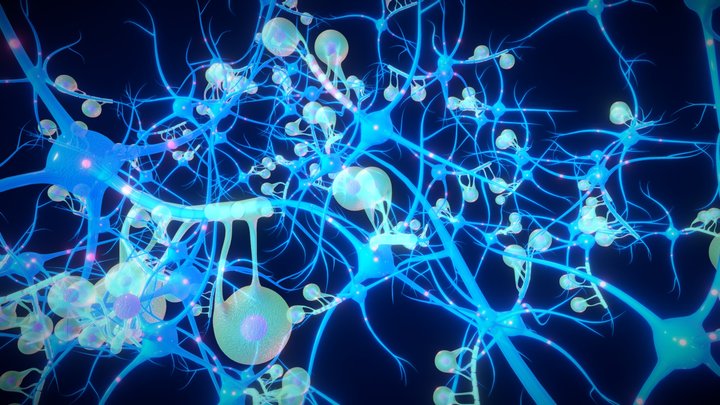
Dietary Fibre
In 100 grams of pine nuts there is around 4 grams of dietary fibre. A healthy intake of dietary fibre contributes to the wellness of our gut bacteria.
Dietary fibre is complex carbohydrates. These are usually long chain sugars. They support an improved relationship between healthy or beneficial gut bacteria and ourselves. Humans can’t digest these as well, however, the bacteria that live in our gut like to consume these. For this reason, they can be referred to as prebiotic fibres.
Nutrients, including prebiotic fibres are essential for the growth of beneficial microbes. Deficiencies can lead to gut dysbiosis and systemic inflammation. Gut dysbiosis is where there is an imbalance of beneficial to harmful gut microbes in the gut. Healthy dietary fibre as found through eating pine nuts can contribute to the reduction of skin conditions such as eczema or acne. This is because some harmful bacteria can lead to huge increases in skin sebum production.
Beneficial gut bacteria can improve immune responses, lower inflammation in the gut and support brain health. Unhealthy gut microbes may also drive intestinal inflammatory responses through activating the immune system. Regularly eating foods rich in prebiotic fibre, such as pine nuts, can encourage health benefits that protect our overall wellness.

Healthy Fatty Acids
Pine nuts are rich in pinolenic acid, representing around 15% of fatty acids found within pine nuts or pine nut oils. This is an unsaturated polymethylene interrupted fatty acid, possibly offering unique health benefits. It is very similar to alpha linolenic acid, another healthy fatty acid found in various nuts and seeds. Other similar fatty acids to pinolenic acid that are found in pine nuts include sciadonic acid and taxoleic acid. Pine nuts are also rich sources of sphingolipids, that are important structural parts of cells and also some sterols.
Studies on pinolenic acid are in the initial stages, however it seems to show promise as a health promoting fat or fatty acid. It seems quite astounding that a fat or fatty acid can have health promoting properties, but this is possible and we require a regular intake of healthy fatty acids each day.
Pinolenic acid has anti-inflammatory action and may also improve lymphocyte function. Lymphocytes are an essential part of our immune system. This is why eating pine nuts are thought to offer potential health benefits through the support of our immune system.
Some fats can initiate the hormone pathways for our general appetite satisfaction and pine nut oil is though to be able to suppress appetite. Studies show that pinolenic acid may be able to reduce weight gain and fat deposition. Pinolenic acid may also improve insulin sensitivity and diabetic resistance. Pine nut oils seem to improve the activity of life supporting antioxidant enzymes which could protect organs such as the kidneys. Oil from pine nut extracts may also improve blood cholesterol profiles, while they have been shown to improve blood vessel function and therefore heart health.
Pine nuts oil and pinolenic acid really add a massive boost to the potential health benefits of eating pine nuts.
Pine Nut Phenolics
The pine nut have a similar phenolic content to other nuts. There is roughly 250mg of active phenolics in pine nuts per 100 grams. Phenolic compounds can be antioxidants within the body and also offer antimicrobial activity. These can be very important in our diet for the prevention of chronic inflammatory diseases.
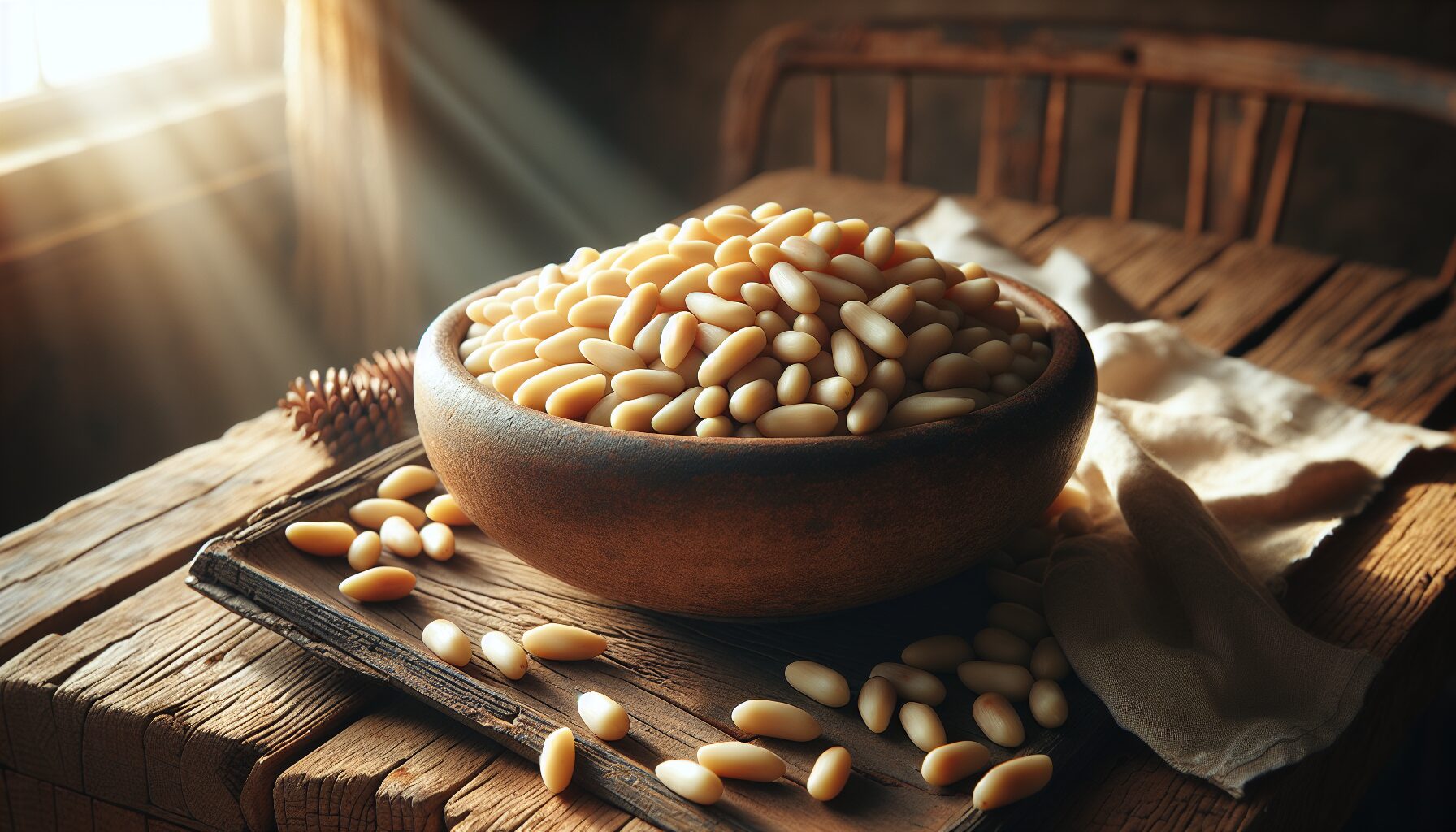
Summary
There are various health benefits of eating pine nuts and they could also support our bodies with vital nutrients for exercise recovery. They are rich in minerals such as copper, manganese and potassium that support key functions throughout the body.
Potassium is an important electrolyte that supports nerve and muscle functions, while also reducing risk of strokes. Manganese supports one the most important antioxidant enzymes in the body. This is essential for reducing risk of inflammatory diseases.
Pine nuts are also rich sources of vegetable source zinc. This mineral has antioxidant properties and supports muscle formation and fertility. Pine nuts also contain a lot of phosphorus, which supports healthy growth and DNA production in the body.
There is an interesting protein profile to pine nuts, rich in leucine, arginine and glutamic acid. This adds to the profile of pine nuts as an exercise supporting food.
There is a high dietary fibre content to pine nuts too. This encourages healthy gut bacteria, reducing systemic inflammation and possibly improving skin health.
Of interest from pine nuts are specific oils that could offer unique health benefits. One of these is pinolenic acid, this is an unsaturated fatty acid that is thought to have anti-inflammatory effects within cells. They may also contribute to supporting immune system functioning. Pinolenic acid may also supress appetite and encourage weight loss.
There are various potential health benefits to eating pine nuts, from muscle recovery support to systemic inflammation reduction, due to the nutrient rich content of pine nuts.
For more interesting articles, see the main articles page.





